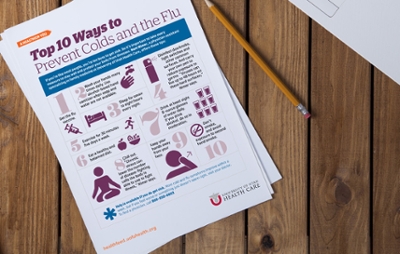Breadcrumb

Did you know that colds and the flu can be spread a day before symptoms appear and up to five days afterward? While you may not be able to avoid exposure altogether, you can take protective measures and boost your immune system to give your body a better chance of warding off illness. "The two best ways to prevent getting sick are to get a flu shot every year and to wash your hands often," says Matt Nimer, a physician assistant specializing in family medicine at University of Utah Health. Download this checklist for the top 10 ways to avoid getting sick.
So what's the difference between a cold and the flu? "In general, the flu comes on more quickly than a cold, and body aches are a prominent feature," Nimer says. "A cold tends to start with a sore throat, then develops additional symptoms, such as nasal congestion and a cough."
Tough It Out or See the Doc?
"In most cases, it's reasonable to wait for seven to 10 days while monitoring and treating symptoms," Nimer says. "But use your intuition. If you're worried or something doesn't feel right, head in to see your doctor." If you experience shortness of breath or chest pain, call 911.